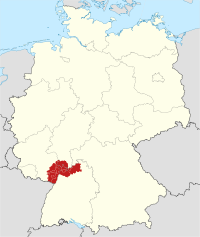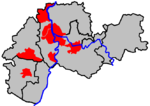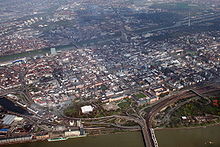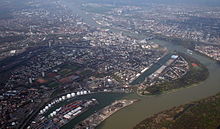- Rhine-Neckar
-
This article is about the German metropolitan region. For the German district, see Rhein-Neckar-Kreis.
Rhine-Neckar Metropolitan Region
Metropolregion Rhein-Neckar
Metropolregion Rhein-Neckarlocation of the Rhine-Neckar Metropolitan Region in Germany Country  Germany
GermanyStates  Hesse
Hesse
 Baden-Württemberg
Baden-Württemberg
 Rhineland-Palatinate
Rhineland-Palatinate
Largest Cities Mannheim
Ludwigshafen
HeidelbergGovernment – Type Metropolregion Rhein-Neckar GmbH Area – Metro 5,637 km2 (2,176.5 sq mi) Population – Metro 2,362,000 – Metro density 419/km2 (1,085.2/sq mi) Time zone CET (UTC+1) Website http://www.wishyouwerehere.de/ The Rhine-Neckar Metropolitan Region (German: Metropolregion Rhein-Neckar), often referred to as Rhein-Neckar-Triangle is a polycentric metropolitan region located in south western Germany, between the Frankfurt/Rhine-Main region to the North and the Stuttgart Region to the South-East.
Rhine-Neckar has a population of some 2.4 million with major cities being Mannheim, Ludwigshafen and Heidelberg. Other cities include the former Free imperial cities of Speyer and Worms. The metro area also encompasses parts of the picturesque Baden and Palatinate wine regions and territory from the three federal states of Baden-Württemberg, Rhineland-Palatinate and Hesse.
The region is named after the rivers Rhine and Neckar, which confluence at Mannheim. Since 2005, the region is officially recognized as a European Metropolitan Area. It has a strong local identity as a successor of the historical Kurpfalz state.
Contents
Core cities
The city of Heidelberg with its castle and ancient old-town is a popular tourist destination. Mannheim, where Carl Benz invented his first automobile, is on the other hand one of the most important industrial centers of Southern Germany. Its twin city Ludwigshafen across the Rhine river is home of the world's largest chemical plant and headquarters of BASF. Walldorf, just south of Heidelberg hosts the headquarters of Europe's largest software company SAP.
The three major cities are surrounded by a diverse and culturally rich region, including the Palatinate with the World Heritage Sites of the Speyer Cathedral and the Lorsch Abbey, the second largest vine region of the country called Deutsche Weinstraße, the picturesque Neckar valley and the ancient cities of Speyer and Worms.
Economy
Transportation
Due to the proximity to the Frankfurt International Airport, the Rhine-Neckar region operates only a small commercial airport by its own - Mannheim City Airport, with commercial airline service to Berlin Tegel Airport. There are ongoing talks and plans about the future of the Mannheim airport, a possible move to Coleman Airfield (north of Mannheim) and generally about the need of a commercial airport in the region (in addition to Frankfurt International Airport).
The railway stations of Mannheim Hbf and Heidelberg Hbf provide ICE connections to the Frankfurt and Stuttgart Airports. ICE high speed lines also connect the region to Cologne, Paris, Karlsruhe/Basel, Munich, Berlin, Hamburg and Dresden. Local train and rapid transit service is provided by the Rhine-Neckar S-Bahn.
Education
The region is home to numerous research institutes and over 20 universities and colleges[1], among them the University of Heidelberg, oldest and one of the most prestigious universities in Germany.
Cities and districts
- Mannheim (324,787 inhabitants)
- Heidelberg (145,642 inhabitants)
- Rhein-Neckar-Kreis (531,723 inhabitants, including Sinsheim, Walldorf and Weinheim)
- Neckar-Odenwald-Kreis (151,043 inhabitants)
- Kreis Bergstraße (265,868 inhabitants, including Bensheim and Heppenheim)
- Ludwigshafen (163,002 inhabitants)
- Frankenthal (Pfalz) (47,534 inhabitants)
- Landau in der Pfalz (41,687 inhabitants)
- Neustadt an der Weinstraße (53,898 inhabitants)
- Speyer (50,280 inhabitants)
- Worms (80,955 inhabitants)
- Rhein-Pfalz-Kreis (148,428 inhabitants)
- Landkreis Bad Dürkheim (134,869 inhabitants)
- Landkreis Germersheim (124,894 inhabitants)
- Landkreis Südliche Weinstraße (110,658 inhabitants)
See also
References
External links
- Wish you were here - Practical information for living, visiting or working in the Rhein-Neckar region
- Official regional portal of Initiative Metropolregion Rhine Neckar (German only)
Metropolitan regions in Germany Berlin/Brandenburg • Bremen/Oldenburg • Hamburg • Hannover-Braunschweig-Göttingen-Wolfsburg • Munich • Nuremberg • Rhine-Main • Rhine-Neckar • Rhine-Ruhr • Central German • Stuttgart
Cities in Germany by population 1,000,000+ 500,000+ 200,000+ Aachen · Augsburg · Bielefeld · Bochum · Bonn · Braunschweig · Chemnitz · Duisburg · Erfurt · Freiburg im Breisgau · Gelsenkirchen · Halle an der Saale · Karlsruhe · Kiel · Krefeld · Lübeck · Magdeburg · Mannheim · Münster · Mönchengladbach · Oberhausen · Rostock · Wiesbaden · Wuppertal
100,000+ Bergisch Gladbach · Bottrop · Bremerhaven · Cottbus · Darmstadt · Erlangen · Fürth · Göttingen · Hagen · Hamm · Heidelberg · Heilbronn · Herne · Hildesheim · Ingolstadt · Jena · Kassel · Koblenz · Leverkusen · Ludwigshafen · Mainz · Moers · Mülheim an der Ruhr · Neuss · Offenbach am Main · Oldenburg · Osnabrück · Paderborn · Pforzheim · Potsdam · Recklinghausen · Regensburg · Remscheid · Reutlingen · Saarbrücken · Salzgitter · Siegen · Solingen · Trier · Ulm · Wolfsburg · Würzburg
Categories:- Mannheim
- Metropolitan areas of Germany
Wikimedia Foundation. 2010.




